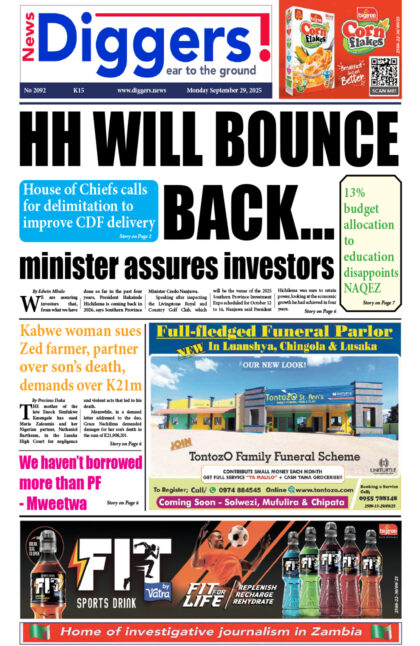The Parliamentary Budget Committee has recommended that the Ministry of Finance should urgently undertake a comprehensive review of the taxation regime so as to constitute a more stable and predictable tax regime.
And Minster of Finance Dr Bwalya Ng’andu has noted that the increase in custom duty from zero to 10 per cent on capital equipment is intended to raise revenue as well as to discourage over invoicing of capital equipment.
Speaking during the second reading of the Customs and Excise Bill in Parliament, Tuesday, Budget Committee chairperson, who is also Mbala PF member of parliament, Mwalimu Simfukwe, said the contribution of the mining sector to government revenue had been unsatisfactory.
“Sir, the committee notes the concerns raised by most stakeholders on the proposed increase of payable customs duty on machinery and capital equipment imported by the mining sector. In this vain, the committee contends that the contribution the mining sector makes towards government revenue has been unsatisfactory. At the same time, the committee is aware that the proposed 10 per cent customs duty has the potential to affect the competitiveness and productivity of the sector. These few include the escalation effect of customs duty on taxes as well as the current economic environment which is distressed and whose effects the mining sector is not immune to. However, allegations of transfer pricing by the mines have registered over time, it is alleged in this regard that some mining entities continue to import capital equipment at inflated prices,” said Simfukwe.
“It is therefore important that the government is through this measure, taking practical steps to address this concern. The committee therefore fully supports this clause but urges the government to ensure that stakeholders are engaged prior to such pronouncements in order to ensure predictability of the tax regime and preparedness by industry. In this vain, the committee recommends that the Ministry of Finance must develop and adopt a medium to long term specific exercise regime, three to five year regime, linked to consumer price inflation. This measure will enhance predictability in the sector and increase the contribution of economic players to the Treasury. In addition, the committee urges the government to undertake a comprehensive review of the taxation regime in the country as a matter of extreme urgency. This will ensure a more holistic approach to address the challenges that upset the tax system so as to have a more stable and predictable tax regime.”
And in response, Dr Ng’andu noted that the increase in custom duty from zero to 10 per cent on capital equipment was intended to raise revenue as well as to discourage over invoicing of capital equipment by the mines.
“Mr Speaker, I have taken note of concerns that the measure has the potential to affect productivity and competitiveness in the mining sector. However, Mr Speaker, stakeholders may be aware that transfer pricing practices that were effected by over invoicing on capital goods on which customs duty is zero or that is refundable, result in loss of company income tax due to high capital allowance claims that made mining companies to declare losses. This measure is therefore intended to raise revenue for the government as well as to discourage over invoicing of capital equipment as such an act will result in higher customs duty payments on importation. Mr Speaker, I have noted the recommendation and I will engage relevant stakeholders to develop adequate supporting policies,” said Dr Ng’andu.
“The committee was also concerned with the piecemeal approach adopted in addressing the general administration of tax in the country and proposed that a more comprehensive review of taxation should be urgently made. This also includes the concern raised by the committee that we need to ensure predictability in taxation as a basis of a stable environment.”
























